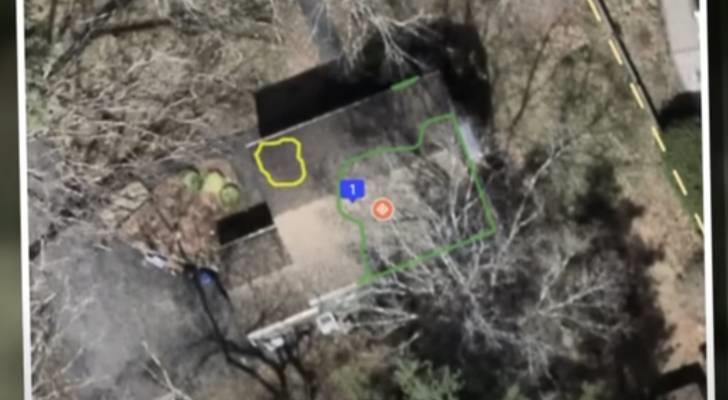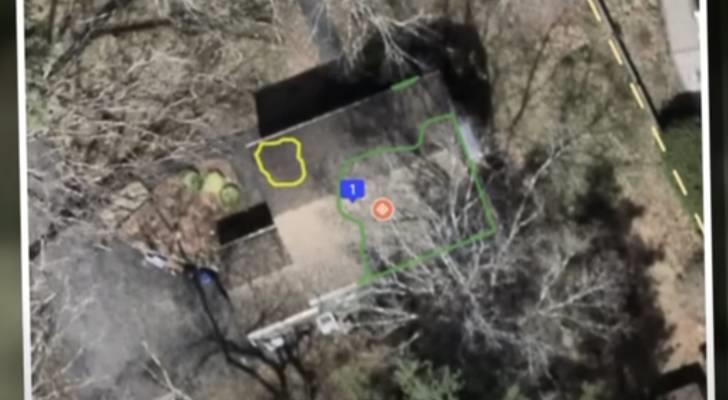
US Insurance Companies Are Using Drones To Inspect Homes Without Owners Knowing - Policies Canceled In Some Cases. But Is That Even Legal?

This article adheres to strict editorial standards. Some or all links may be monetized.
Your homeowners' insurance is just that - your peace of mind should something go catastrophically wrong at home.
It's typically not something you expect to be hassled with, nor do you wish to be threatened with policy cancellation over trivial matters.
Must Read-
Thanks to Jeff Bezos, you can now become a landlord for as little as $100 - and no, you don't have to deal with tenants or fix freezers. Here's how
Dave Ramsey warns nearly 50% of Americans are making 1 big Social Security mistake - here's what it is and 3 simple steps to fix it ASAP
I'm 49 years old and have nothing saved for retirement - what should I do? Don't panic. Here are 6 of the easiest ways you can catch up (and fast)
So when a Massachusetts homeowner learned her insurance company was threatening to cancel her policy based on drone surveillance that she didn't authorize, she was understandably shocked.
"It was very invasive, because they had taken a picture of my house without me knowing, which was really kind of crazy," Lynne Schueler told reporters at WBZ-TV [1] in Boston.
Insurance drone surveillance is becoming common and something Americans are often unaware of - but is it legal? And, what rights do homeowners have against unauthorized surveillance by insurance companies?
Drones are insurers' latest toolInsurers are increasingly using drones to inspect properties, sometimes resulting in sudden policy cancellations. Homeowner Schueler discovered her insurance was being dropped after a drone spotted overhanging tree branches, giving her just six weeks to remove them or lose coverage.
"I was very nervous. I'm like, 'How much is this going to cost, and can I find somebody to take these branches down?' And, plus, I was losing branches on a beautiful tree," she said. "It ended up costing $1,200. I had no choice. Despite being a long-time customer with no claims, she was still targeted.
While Schueler was fortunate to find a tree removal company, not everyone is. The practice of insurers using drones for surveillance on policyholders is "becoming very, very common," according to Amy Bach, executive director at United Policyholders, a consumer advocacy group.
Experts advise shopping around for insurance - not just for better rates, but also to find a company with a solid reputation for fairness and transparency. Choosing the right insurer can help you avoid surprise cancellations and unnecessary costs.
Platforms like OfficialHomeInsurance can take the hassle out of shopping for home insurance. In just under two minutes, you can compare competitive rates from top insurance providers, all in one place - and save an average of $482 per month.
Third-party firms are selling your informationInsurance companies aren't doing the surveillance themselves - they're buying data from third-party“insurtech” firms that use advanced technology to monitor properties.
“It's kind of like your credit score is a big deal. Now, your insurance score is a big deal in terms of whether or not they are going to keep you, what they're going to charge you,” Bach told WINK News [2] in Fort Myers, Florida.
As surveillance by insurers grows, experts are raising concerns. "We're pushing for reasonable limits on how insurers can use these images, but they're resisting," said Bach.
Massachusetts State Rep. David LeBoeuf has also proposed legislation [3] requiring insurers to disclose aerial images used in policy decisions and give homeowners the right to appeal or fix issues before losing coverage.
That's why finding the right home insurance provider is crucial - not just for affordability. You may want to consider which insurers will be transparent about how your property is evaluated.
Read more: How much cash do you plan to keep on hand after you retire? Here are 3 of the biggest reasons you'll need a substantial stash of savings in retirement
Insurers argue that drones reduce costsInsurers say drones help reduce costs and improve accuracy when assessing home conditions.“It's less intrusive than in-person inspections,” said Mark Friedlander of the Insurance Information Institute. Drone use is already widespread, especially after natural disasters, and it's expected to grow.
By 2030, satellite images could allow daily property updates, increasing scrutiny, according to the Wall Street Journal.
As for Lynne Schueler, her policy was eventually renewed for another year, but she knows drone checks will likely continue before future renewals.
What can you do?But just because insurers can use drones for aerial inspection of your home, here's what your insurer cannot do when surveilling you:
-
Trespass on your property
Record the inside of your home without your permission
Harass or intimidate you
Misrepresent themselves (claiming to be a city or utility worker, for example)
Insurers commonly use drones to inspect homes during policy renewal or after new coverage is purchased, says Friedlander.“The goal isn't to eliminate customers - it's to assess risk,” he explains.
As drone use grows, homeowners should talk to their insurers about how risk is evaluated and how technology may impact premiums. Making necessary home repairs and regularly reviewing and comparing policies can also help reduce costs and avoid surprises.
With OfficialHomeInsurance, you can easily find the coverage you need at a price that can fit your budget. All you need to do is fill in a bit of information and it will instantly sort through over 200 insurers to find you the best deals available in your area.
Automatically invest your spare changeAfter finding the right insurance company - one that's reputable, transparent and helps lower your monthly costs - it can be tempting to spend those extra dollars right away. But instead of doing that, consider putting those savings to work.
With a platform like Acorns, you can invest your spare change automatically and effortlessly.
Here's how it works: When you buy something with your debit or credit card, Acorns rounds up the purchase to the nearest dollar and invests the difference. That leftover change you barely notice? It starts working for you right away.
Let's say you grab a sandwich for $8.45, Acorns rounds it up to $9.00 and invests the extra $0.55 automatically. It might not seem like much, but small round-ups from everyday purchases can add up to hundreds each year - and potentially even more as those dollars grow in the market.
What's more, if you sign up with a recurring deposit, you can get a $20 bonus.
What to read next-
Want an extra $1,300,000 when you retire? Dave Ramsey says this 7-step plan 'works every single time' to kill debt, get rich in America - and that 'anyone' can do it
'Rich Dad, Poor Dad' author Robert Kiyosaki says this 1 asset will surge 400% in a year - and he begs investors not to miss its 'explosion'
There's still a 35% chance of a recession hitting the American economy this year - protect your retirement savings with these 5 essential money moves ASAP
This tiny hot Costco item has skyrocketed 74% in price in under 2 years - but now the retail giant is restricting purchase. Here's how to buy the coveted asset in bulk
Join 200,000+ readers and get Moneywise's best stories and exclusive interviews first - clear insights curated and delivered weekly. Subscribe now.
Article sourcesAt Moneywise, we consider it our responsibility to produce accurate and trustworthy content people can rely on to inform their financial decisions. We rely on vetted sources such as government data, financial records and expert interviews and highlight credible third-party reporting when appropriate.
We are committed to transparency and accountability, correcting errors openly and adhering to the best practices of the journalism industry. For more details, see our editorial ethics and guidelines.
[1]. WBZ-TV.“Insurance companies using drones to inspect homes without alerting owners. Here's what you should know.”
[2]. WINK News.“Insurers are using drones to inspect homes”
[3]. The 194th General Court of the Commonwealth of Massachusetts.“An Act relative to insurers' usage of aerial images”
This article provides information only and should not be construed as advice. It is provided without warranty of any kind.
Legal Disclaimer:
MENAFN provides the
information “as is” without warranty of any kind. We do not accept
any responsibility or liability for the accuracy, content, images,
videos, licenses, completeness, legality, or reliability of the information
contained in this article. If you have any complaints or copyright
issues related to this article, kindly contact the provider above.


















Comments
No comment